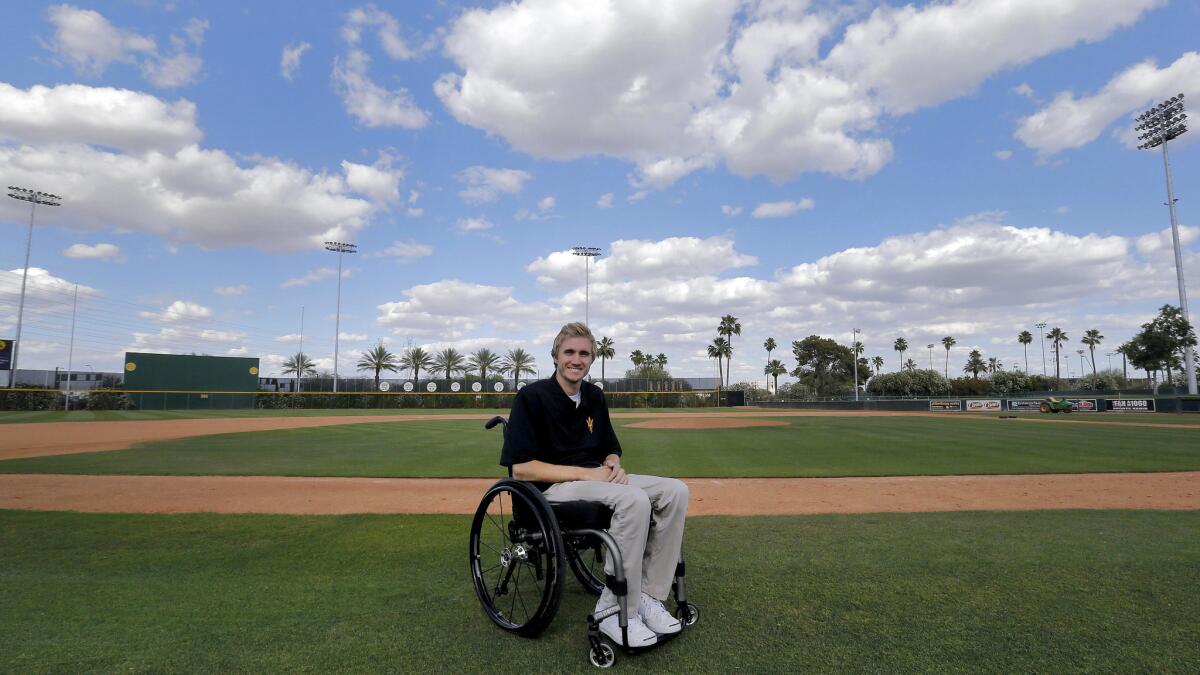Column: Cory Hahn’s life changes with accident, but baseball remains the same

Cory Hahn poses in front of Arizona State’s Packard Stadium, where he suffered a devastating injury in his third collegiate game that left him paralyzed from the chest down. Hahn has come a long way since the injury.
From Tempe, Ariz. — He had already rolled across the stage to accept his degree, the graduation ceremony halted to create a safe path for his wheelchair, wild cheering everywhere.
But Cory Hahn had to take one more test. The former Southland baseball star, who graduated from Arizona State with a business degree just three years after a head-first slide turned him into a quadriplegic, was presented with one more seemingly insurmountable challenge.
For his final act as a member of the Sun Devils baseball team, in the final game at historic Packard Stadium his week, Hahn was asked to throw out the ceremonial first pitch.
He had not thrown a baseball since the accident at second base in the third game of his freshman season. He wasn’t even sure throwing a baseball was possible. His left arm had gained some strength, but his fingers still had no ability to grip. How was he going to hold it? How was he going to propel it forward? How far could it really go?
The day before the pitch, Cory and his father, Dale, visited an empty bullpen, found a bucket of balls, and started practicing. The father had played catch with the son for years, but never like this. The actions were awkward. The memories were painful. Yet they kept working at it, throw, drop, throw, drop. Cory finally realized he needed to put pine tar on his hand to keep the ball from falling out, leading to the joke he could be the first ceremonial first-ball pitcher to be ejected from a game.
The following evening, before the Sun Devils hosted Abilene Christian, Hahn was wheeled out to the field. His chair was placed directly in front of home plate. Nearly 8,000 fans in the packed stadium began standing and cheering with an ovation that lasted more than a minute. Hahn took a deep breath and tried to focus. In the stands, his mother, Chris, fought back tears. In front of the dugout, his coach Tim Esmay felt weak in the knees.
Behind the plate was pitcher and longtime friend Josh McAlister. As he crouched to catch Hahn’s attempt, McAlister found himself staring out beyond the wheelchair to the dusty spot around second base where Hahn’s life changed forever.
“I looked out there to where Cory was once laying, and I thought, ‘Wow, look how far he’s come,’ ‘’ said McAlister.
How far exactly? Nine feet. Cory Hahn slung the pitch from his left hand and watched it travel nine feet, cross home plate, and bounce into McAlister’s glove. Nine lousy feet? Nine wonderful feet.
“It was nine feet farther than I could throw before,’’ said Hahn with a grin.
Of all the commencement addresses swirling around during this time of year, surely none can match the power of the one Hahn just gave, a 10-word message about appreciating the simple joy of growth.
It was nine feet farther than I could throw before.
------------
The journey through hell has ended in a hallelujah. Cory Hahn finished college in four years, and is now preparing for a job as a scout with the Arizona Diamondbacks, and who can believe it?
I didn’t believe it. I initially met Hahn in February of 2012, about a month after he returned to Arizona State following his accident a year earlier. I wrote a story of hope, but after encountering the seemingly impossible challenges of his situation, I didn’t feel much hope.
Hahn had been an Orange County high school baseball legend, a former California Mr. Baseball who led Mater Dei to a 2010 CIF championship with his arm (five perfect innings), his bat (long home run) and his glove (over-the-shoulder catch). He was such an energetic and gifted outfielder, he was in the Sun Devils starting lineup the opening game of his freshman season. But in the first inning of his third game, on the back end of a double steal, he slid head-first into second base and broke his neck so brutally that he actually heard it snap.
He became a C5 quadriplegic, paralyzed from the chest down, with limited use of his arms and little use of his hands. After his initial hospitalization and rehabilitation, some thought he would transfer to a school closer to his Corona home and live with his parents. But he was insistent on returning to college, and returning to his baseball team, so his father, Dale, quit his sales job and returned with him as his caretaker.
Together, they journeyed into what seemed to an impassable storm. Dale would awaken every morning in a hotel room and drive to the house that Cory shared with teammates. Dale would then spend 90 minutes preparing Cory for the day, and then drive him to classes and rehabilitation before returning him home. By the time Dale had finally helped Cory back into bed, it was often late, and both men were physically and emotionally exhausted. It was inspiring, but also unsettling, and I wrote this:
How much longer can Dale do it? They are reluctant to hire a caretaker while Cory is still adjusting to his college environment, so Dale will stay there at least for this semester. They are surviving financially with help from a couple of recent fundraisers and an ongoing Cory Hahn fund that can be accessed from the Mater Dei website. But what next? They have no idea. Nobody has any idea. At this point, the only thing certain is the devotion in their weary eyes as they look at each other from across a table, Cory Hahn stuck in a chair, Dale Hahn trying like hell to give him wings.
Three years later, guess what? Yep, wings.
Hahn never left school. Not even for a minute. He graduated in four years with a business degree that shines with a 3.2 grade-point average. He never left the baseball team. Not for an inning. He became a player-coach and sat in the dugout for every home game. The Diamondbacks were so impressed that last summer, in preparation for hiring him as a scout, they drafted him in the 34th round to coincide with his number.
“It’s shocking, unbelievable, a great story,” said McAlister. “But then again, knowing Cory, it’s not.’’
For three years, despite having a body that is frozen below the chest, Hahn never, ever stopped moving. He is driving his own van now. He is feeding himself now. He bangs out texts with his thumbs, he types papers with his knuckles and he’s even learned to sign a good autograph after many nights of sitting alone in his apartment scribbling on old baseballs. Yes, this is an important skill, because wherever he goes, his story has become so compelling that people want that autograph.
“I never talked about it publicly, but, yeah, in the beginning, when I first said was going to graduate in four years, I had my doubts,’’ said Cory. “I just knew I was going to fight.”
Fighting alongside him, for three years without a day off, in what onlookers call the ultimate love story, has been his father. Although Dale eventually moved out of the hotel into a less-expensive ASU staff apartment while his son moved into his own apartment, little else has changed. Every morning, Dale is his son’s alarm clock, arriving at his apartment about 8 a.m., opening the blinds, turning on the television to ESPN “SportsCenter,” and beginning the preparations for the day. Every night, he still shows up to help his son into bed, even if it’s 3 a.m. after a college party. One night, Dale was so tired driving to his son’s house, his car was weaving such that he was briefly stopped by a police officer.
“This is such a selfless act on Dale’s part, but you’ve seen how important it for Cory’s recovery,” said Chris Hahn, who has remained in their Corona home working as a sales manager for a uniform company. “He has sacrificed three years of his life to see what doors can be opened for our son.”
Cory says his father’s strong and constant presence has helped keep him from quitting. Dale is so worried about keeping that strength that, while Cory has been in class, he has been working out at a campus fitness center, trying to maintain the muscles and balance required for odd positions from which he must lift his 124-pound son.
“If you have kids, you have kids for life,” said Dale, 52. “Yeah, I miss my wife. I miss my other son, I really would like to get back in the workforce one day. But right now I’m a Dad doing what a Dad needs to do.”
The other people fighting with Cory have been a clubhouse full of them, the Arizona State baseball team that never let him leave. Cory still has a corner locker. There are still uniforms hanging there. His number 34 and initials are in black letters on a clubhouse wall, and in other forms on the team’s stirrups and shirts. Sometimes players even scribble the number under the bills of their caps.
He is not only a symbolic presence here, but an active one. He watches every home game from his wheelchair at the end of the dugout bench. There is always at least one team member or official casually sitting near him as potential protection for a foul ball, as Hahn does not have the ability to shield himself or move out of the way. Amazingly, or perhaps appropriately, he’s never been hit. That doesn’t stop the constant, nagging hurt of watching a game that he used to play.
“Every day, throughout the whole day, I miss playing,” Hahn said. “I miss playing more than I miss walking. Sometimes it’s so painful to watch. But these guys want me here. These guys need me.’’
From his spot on the bench, Hahn gave hitting tips. From his clubhouse corner, he sometimes gave inspirational talks, even addressing the entire team before this season. He found his new role in an atmosphere created by Esmay, the ASU coach who, from the moment of the injury, has refused to release Hahn from his embrace.
“This is about the Sun Devil family, which is about more than what you do on the field,” said Esmay. “Seeing how much life Cory brings to us, seeing his connection with his teammates, we weren’t going to let his accident define him. We need him in our locker room. We need his life. We need his presence.”
That presence will now move across town, to the Diamondbacks, where a new journey will bring new questions. His father will stay with him as he makes the adjustment to the working world, but he will need caretaking indefinitely, so how will that work?
“In some ways, we are back to where we were three years ago, wondering what will happen next,’’ said Dale with a smile.
Oh, but this time, I truly believe they will it figure out. This time, who would bet against them? The Hahn family is not where they were three years ago. They are nine gritty, glorious feet farther.
More to Read
Go beyond the scoreboard
Get the latest on L.A.'s teams in the daily Sports Report newsletter.
You may occasionally receive promotional content from the Los Angeles Times.











